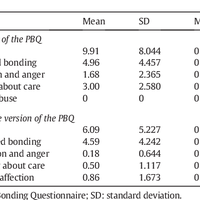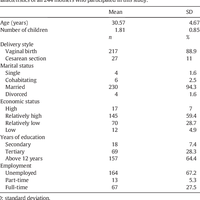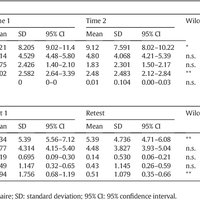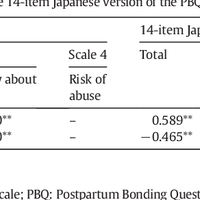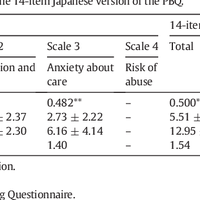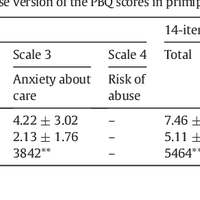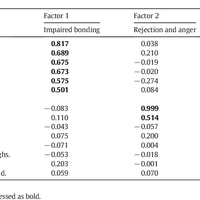Abstract
Objective: The purpose of this study was to develop the Japanese version of the Postpartum Bonding Questionnaire (PBQ) to gather data on Japanese mothers for comparison with other cultures and to examine the scale structure of the PBQ among Japanese mothers. Methods: We administered the PBQ to a cross-section of 244 mothers 4. weeks after delivery and again 2. weeks later to 199 mothers as a retest to examine reliability. We used exploratory factor analysis to evaluate the factor structure of the PBQ. Correlations with the Mother-to-Infant Bonding Scale (MIBS), the Maternal Attachment Inventory (MAI), Edinburgh Postnatal Depression Scale (EPDS), and sociodemographic variables were calculated for validation. Results: The 14-item version of the PBQ extracted by exploratory analysis consisted of four factors: 'impaired bonding', 'rejection and anger', 'anxiety about care', and 'lack of affection'. We found significant correlations of the total scores of the PBQ and the 14-item version of the PBQ positively with the MIBS and negatively with the MAI. Moderate significant correlations with total scores were also found with the EPDS. Total scores for primiparous and depressed mothers were higher than those for multiparous mothers and mothers without depression. Conclusion: The results of this study demonstrated the reliability and validity of the PBQ and the 14-item version of the PBQ in Japanese mothers 4. weeks after delivery.
Figures
Author supplied keywords
Register to see more suggestions
Mendeley helps you to discover research relevant for your work.
Cite
CITATION STYLE
Suetsugu, Y., Honjo, S., Ikeda, M., & Kamibeppu, K. (2015). The Japanese version of the Postpartum Bonding Questionnaire: Examination of the reliability, validity, and scale structure. Journal of Psychosomatic Research, 79(1), 55–61. https://doi.org/10.1016/j.jpsychores.2015.02.008

